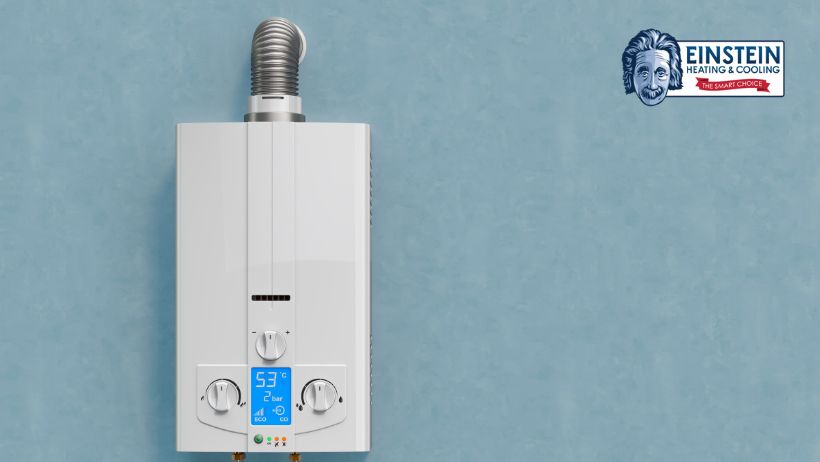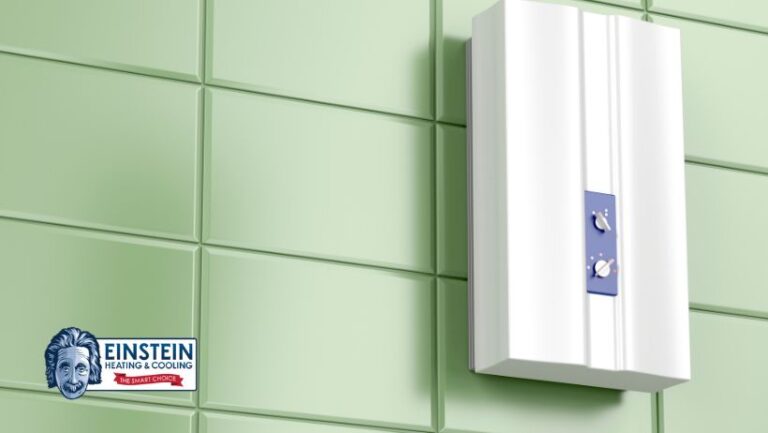When it comes to creating a comfortable and energy-efficient home in Bend, Oregon, your HVAC (Heating, Ventilation, and Air Conditioning) system plays a crucial role. One often overlooked component of your HVAC system is the water heater, and switching to a tankless water heater can have a significant impact on both your comfort and energy consumption. In this comprehensive guide, we’ll explore why you should consider installing a tankless water heater in your Bend home. We’ll break down the numerous advantages that this upgrade brings to the table.
1. Energy Efficiency: Reducing Your Carbon Footprint
Tankless Water Heaters are Energy Efficient
Tankless water heaters are renowned for their energy efficiency. Unlike traditional tank water heaters, which constantly maintain a large volume of water at a specific temperature, tankless units heat water on demand. This means that they only use energy when you’re actively using hot water, eliminating the energy wasted in standby heat loss.
In addition to the on-demand heating process, tankless water heaters use high-efficiency heating methods, such as natural gas or electricity, to quickly heat the water to the desired temperature. These systems are designed to maximize energy use, and this efficiency can significantly reduce your home’s energy consumption.
Decreased Standby Heat Loss
One of the primary sources of energy inefficiency in conventional water heaters is standby heat loss. Even when you’re not using hot water, a traditional tank water heater continues to work to maintain the water’s temperature in the storage tank. This constant heating process consumes energy, leading to higher energy bills and increased environmental impact. Tankless water heaters, on the other hand, do not experience standby heat loss because they only heat water when it’s needed, resulting in a drastic reduction in wasted energy.
Efficient Heating Methods
Tankless water heaters use energy-efficient heating methods, such as natural gas or electricity, to heat water quickly and effectively. For gas-fired tankless units, a burner ignites when hot water is required, and it heats the water as it passes through the heat exchanger. Electric tankless water heaters use heating elements to achieve the same purpose. These methods are highly efficient, making the most of the energy they consume. As a result, you not only save money on your energy bills but also contribute to a more sustainable and eco-friendly home.
2. Continuous Hot Water Supply: Never Run Out Again
On-Demand Hot Water
One of the most significant advantages of tankless water heaters is their ability to provide an uninterrupted supply of hot water. Unlike traditional water heaters that store a finite amount of hot water in a tank, tankless units heat water as it flows through the system. This means you’ll never run out of hot water during your showers, baths, or household chores.
Avoiding Cold Showers
Running out of hot water, especially in the middle of a shower, can be an unpleasant experience. With a tankless water heater, this scenario becomes a thing of the past. Whether you have a large family with high hot water demand or simply enjoy long, luxurious showers, a tankless water heater ensures that everyone can enjoy a warm shower without interruptions.
Ideal for Larger Families
Tankless water heaters are particularly well-suited for larger families. In homes with multiple occupants who require hot water simultaneously, a tankless system can meet the demand without any drop in water temperature or pressure. This ensures that everyone in your household can go about their daily routines without worrying about hot water availability.
3. Space-Saving Design: Free Up Valuable Space
Compact and Wall-Mountable
The space-saving design of tankless water heaters is a significant advantage for homeowners, especially those in smaller residences or homes with limited storage options. These units are typically compact and can be wall-mounted, freeing up valuable floor space. The compact design allows for more flexible installation options, so you can choose the most convenient and unobtrusive location for your tankless water heater.
Create More Storage Space
Traditional tank water heaters, which can be bulky and require a dedicated storage space, can limit your home’s storage options. By replacing your conventional water heater with a tankless unit, you’ll create more storage space for your belongings. This can be especially important in homes with limited storage areas, as it allows you to maximize your available space for other purposes.
Flexible Installation Options
Tankless water heaters offer flexible installation options. They can be installed in various locations, including closets, utility rooms, garages, or even outdoors, depending on the model and local building codes. This flexibility ensures that you can choose the installation location that best suits your home’s layout and your specific needs.

4. Longevity and Durability: Invest in Lasting Quality
Extended Lifespan
Tankless water heaters are known for their longevity. With proper maintenance and care, these units can outlive traditional tank water heaters by a significant margin. While the average lifespan of a tank water heater is typically 10 to 15 years, tankless units can last 20 years or more. This extended lifespan not only provides you with reliable hot water for many years but also saves you money on replacements.
Reduced Maintenance
The durability of tankless water heaters contributes to reduced maintenance requirements. Since these units don’t store water in a tank, they are less susceptible to issues like tank corrosion or leaks. Traditional tank water heaters are more prone to rust and corrosion over time, which can lead to maintenance needs and potentially costly repairs. Tankless water heaters, with their robust construction, minimize these risks, making maintenance more straightforward and less frequent.
Quality Build
Most tankless water heaters are built with high-quality materials and components, ensuring their reliability and performance over the long term. These systems are designed to withstand the demands of continuous operation and heating water on demand. Quality construction, combined with the absence of a storage tank, results in a more durable and dependable water heating solution for your home.
5. Cost Savings: Lower Utility Bills
Energy Savings
The energy efficiency of tankless water heaters translates into substantial cost savings. These units only consume energy when you use hot water, reducing your overall energy consumption. Traditional tank water heaters, on the other hand, continuously heat water even when it’s not in use, leading to higher energy bills. By switching to a tankless water heater, you’ll enjoy energy savings that can significantly impact your monthly utility costs.
Reduced Water Heating Costs
Heating water can account for a substantial portion of your overall energy expenses. Tankless water heaters help lower these costs by eliminating the need to keep a large volume of water hot in a storage tank. Since tankless units heat water on demand, you won’t waste energy on reheating water that has cooled down in the tank. This efficiency reduces the amount of energy required to maintain a consistent supply of hot water, further lowering your water heating costs.
Potential Rebates and Incentives
Depending on your location, there may be rebates and incentives available for upgrading to a more energy-efficient water heating system. Many government agencies and utility companies offer financial incentives to encourage homeowners to switch to tankless water heaters or other energy-efficient appliances. These rebates and incentives can offset the initial cost of installation, making the transition to a tankless water heater an even more financially attractive option.
6. Improved Water Quality: Say Goodbye to Rusty Water
Fresh, Clean Water
Tankless water heaters offer improved water quality, especially in areas with hard water. In conventional tank water heaters, the storage tank is susceptible to rust and corrosion, which can affect the quality of the hot water. Over time, this can result in rusty or discolored water. If you compare a tankless water heater vs tank water heater, there’s no storage tank to rust in a tankless water heater, so you’ll enjoy fresher, cleaner hot water.
No Tank Corrosion
Traditional tank water heaters are prone to corrosion due to the constant presence of water inside the tank. This corrosion can lead to rust particles in the water, affecting its taste, appearance, and quality. Tankless water heaters, however, do not store water, eliminating the risk of tank corrosion and the associated water quality issues.
Enhanced Water Quality
The absence of a storage tank in tankless water heaters also means they are less susceptible to mineral buildup and scale. Hard water, which contains minerals like calcium and magnesium, can lead to scaling in tank-based systems. Scaling can affect both water quality and the longevity of the water heater. In contrast, tankless units are more resistant to scaling, resulting in enhanced water quality and a longer-lasting water heater.
7. Precise Temperature Control: Tailored Comfort
Customizable Temperature Settings
Tankless water heaters allow for precise temperature control. You can easily customize the water temperature to your preferences, ensuring that your showers, baths, and other hot water applications are as comfortable as possible. This level of control is a significant advantage, as it allows each member of your household to enjoy hot water at their preferred temperature.
Avoid Scalding
The ability to set precise temperature levels also helps you avoid the risk of scalding. With traditional tank water heaters, there is a risk of sudden fluctuations in water temperature, which can lead to scalding injuries, especially for young children and the elderly. Tankless water heaters provide consistent and accurate temperature control, reducing the risk of hot water-related accidents.
Suitable for Different Needs
Tankless water heaters are versatile and can accommodate a variety of hot water needs. Whether you’re filling a large bathtub, running multiple showers simultaneously, or performing other tasks that require a consistent supply of hot water at different flow rates, a tankless unit can meet these demands with ease. This adaptability ensures that your hot water needs are met, regardless of the specific applications.
8. Low Maintenance: Simplified Care
Minimal Maintenance
Maintaining a tankless water heater is relatively straightforward and requires less effort compared to traditional tank water heaters. Since tankless units do not store water, they are less susceptible to issues like tank corrosion or leaks, reducing the need for frequent maintenance. This low-maintenance aspect contributes to the long-term reliability and performance of your water heater.
Longevity
The reduced maintenance requirements of tankless water heaters are closely tied to their longevity. These units are built to withstand the demands of continuous operation and heating water on demand. With proper care and occasional maintenance, you can expect your tankless water heater to provide reliable hot water for many years, minimizing the need for frequent repairs or replacements.
Reliable Performance
The dependable performance of tankless water heaters is a significant advantage for homeowners. Since they do not have a storage tank, there is no risk of tank leakage or rupturing, which can be a common issue with traditional tank water heaters. This reliable performance ensures that you have a continuous and consistent supply of hot water, even during peak demand periods in your home.
9. Environmental Benefits: Reduce Your Water Waste
Reduced Water Waste
Tankless water heaters not only save energy but also reduce water waste. Traditional tank water heaters often require running the tap for some time to allow the stored water to heat up before it reaches the desired temperature. This water wastage can be significant over time. In contrast, tankless units heat water as it flows through the system, eliminating the need for preheating. This results in a more efficient use of water and less wastage.
Eco-Friendly
The reduced water waste associated with tankless water heaters makes them more environmentally friendly. By minimizing water wastage, you contribute to water conservation efforts and help preserve this valuable resource. Eco-conscious homeowners in Bend can appreciate the sustainability of tankless water heaters and their positive impact on the environment.
Lower Carbon Emissions
In addition to water savings, tankless water heaters also contribute to lower carbon emissions. Their energy-efficient design reduces the demand for fossil fuels or electricity to heat water. This, in turn, lowers your home’s carbon footprint, making tankless water heaters a responsible choice for homeowners who want to reduce their environmental impact.
10. Enhanced Home Value: Attract Potential Buyers
Upgraded Amenities
Investing in a tankless water heater can enhance the value of your home. Potential buyers are often attracted to properties with modern and energy-efficient amenities. A tankless water heater is considered a valuable upgrade, signaling to prospective buyers that your home is equipped with efficient and environmentally responsible features. This can make your property more appealing and set it apart from other homes on the market.
Home Value Appreciation
The addition of a tankless water heater can contribute to the overall appreciation of your home’s value. As energy efficiency becomes an increasingly important consideration for homebuyers, a tankless water heater can add value to your property. This can be particularly beneficial when selling your home or when assessing its worth for potential refinancing.
Attracting Buyers
Homes with energy-efficient and modern amenities are more attractive to buyers. By having a tankless water heater in your home, you are likely to attract a broader range of potential buyers who value sustainability and energy efficiency. This can result in a quicker sale and potentially a higher selling price, making the investment in a tankless water heater a wise financial decision.
Conclusion: Upgrade Your Bend Home with a Tankless Water Heater
By considering the installation of a tankless water heater in your Bend home, you can enjoy numerous benefits that improve your quality of life while reducing your environmental impact. From energy efficiency and continuous hot water to space-saving design and cost savings, a tankless water heater is a wise choice for any homeowner. Additionally, the potential for improved water quality, precise temperature control, and lower maintenance requirements makes it a practical investment in your household.
When you make the switch to a tankless water heater, you not only enhance your home’s comfort and efficiency but also take a positive step towards a greener and more sustainable future. Upgrade your Bend residence with this innovative technology, and experience the difference for yourself.
Choose Einstein Heating and Cooling for Your Tankless Water Heater and HVAC Needs
When it comes to addressing your HVAC needs and considering the installation of a tankless water heater in your Bend home, look no further than Einstein Heating and Cooling. Our commitment to providing top-notch HVAC services and energy-efficient solutions perfectly aligns with the advantages of having a tankless water heater. We understand that a well-functioning HVAC system is crucial in creating a comfortable and energy-efficient home. With years of experience and a team of skilled professionals, we offer expert guidance in choosing and installing tankless water heaters that maximize your home’s comfort while reducing your carbon footprint. Our dedication to superior service, energy efficiency, and environmental sustainability makes us the ideal partner for enhancing your Bend residence with a tankless water heater, ensuring you enjoy continuous hot water, reduced utility bills, and an eco-friendlier home.








